Rocz Panstw Zakl Hig 2013, 64(1): 1-12
How nutritional status, diet and dietary supplements can affect autism. A review
[How nutritional status, diet and dietary supplements can affect autism. A review]
ABSTRACT
Autism is a neurodevelopmental disorder with symptoms arising that are apparent throughout the patient’s lifespan. Autism Spectrum Disorders (ASD) are characterised by impaired social and communication interactions as well as restricted, repetitive interests and behaviour. Currently in Poland, about 50 000 people suffer from autism, of which 1/5 are children. Epidemiological studies show that the incidence of autism is increasing, which may be due to the diagnostic category of ASD having been developed. Of vital importance in the treatment of autism, is early diagnosis which is conducive to more rapidly improving the quality of patients’ health. It is believed that both genetic and environmental factors may affect the development of the disease. Moreover, expert opinion emphasises the importance of making an adequate diagnosis when the first symptoms of autism start appearing which can be both psychological, gastro-intestinal and metabolic ones. Conventional treatment is based on the combination of behavioural and dietary therapy together with pharmacotherapy. For example, adapting an appropriate diet could help alleviate the disease severity, as well as the psychological and gastrointestinal symptoms. Much scientific research has indicated that pathogenesis of autism may have a beginning already in foetal life. During pregnancy, specialists should take special heed of metabolic disorders, which can increase the risk of ASD in children. One of the dietician’s tasks are to properly assess the nutritional status of mothers before and during pregnancy, thereby allowing changes in nutrition to be made wherever necessary in order that metabolic indicators be improved. Thus an important part of autism therapy is the improving patient’s nutritional status to prevent the onset of gastrointestinal symptoms. Adopting diets and tailored to individual disease symptoms, is linked to the nutritional requirements and food preferences of the patient. Specialists also emphasise that continual monitoring of the diet and nutritional status of children with ASD is required. It is also essential to start adequate dietary management in autistic patients with overweight, obesity or wasting, caused by improper nutrition. Frequently only a dietary therapy is insufficient to effectively treat autism. Many studies demonstrate the need to supplement the nutritional deficiencies of autistic patients with fatty acids omega-3, probiotics, vitamins and minerals in combination with medical and psychological interventions. A properly designed elimination diet adapted to the patient’s individual may also lead to relief of the autism symptoms and the occurrence of gastrointestinal disorders. Parents and caregivers should therefore be aware of the benefits of nutritional therapy and need for proper monitoring the treatment of patients with ASD. A review of nutritional factors, dietary treatments and diet supplementation in patients with ASD is presented.
STRESZCZENIE
Autyzm to zaburzenia o podłożu neurorozwojowym, trwające przez całe życie pacjenta. Charakterystycznymi objawami są nieprawidłowości w zachowaniu, obejmujące zaburzenia w strefach rozumowania, kontaktów socjalnych i porozumiewania się. Obecnie w Polsce żyje około 50 tysięcy osób dotkniętych autyzmem, w tym 1/5 stanowią dzieci. Wyniki badań epidemiologicznych dowodzą, iż częstość występowania autyzmu stale wzrasta, co może być spowodowane poszerzeniem diagnostyki ASD (ang. Autism Spectrum Disorders). Podstawowe znaczenie w terapii autyzmu ma wczesne rozpoznanie choroby, sprzyjające szybszej poprawie stanu zdrowia pacjentów. Na rozwój autyzmu mają wpływ zarówno czynniki genetyczne, jak i środowiskowe. Specjaliści podkreślają znaczenie odpowiedniej diagnostyki pierwszych objawów autyzmu, zarówno psychicznych jak i trawienno-metabolicznych. W leczeniu autyzmu wykorzystywane są różne kierunki terapii: leczenie farmakologiczne, behawioralne lub dietetyczne. Odpowiednie dostosowanie diety do stanu zaawansowania choroby może mieć pozytywne skutki w wyciszaniu i łagodzeniu objawów psychicznych i gastroenterologicznych autyzmu. Autorzy licznych doniesień naukowych wskazują, iż patogeneza autyzmu może mieć początek już w życiu płodowym dziecka. Należy zwrócić uwagę na występowanie zaburzeń metabolicznych u kobiet w czasie ciąży, które mogą zwiększać ryzyko występowania zaburzeń autystycznych u dziecka. Zadaniem dietetyka jest odpowiednia ocena stanu odżywienia matki przed i w czasie ciąży, pozwalająca na wprowadzenie zmian w żywieniu, prowadzących do poprawy wskaźników metabolicznych. Poprawa stanu odżywienia pacjenta przy jednoczesnym niedopuszczeniu do pojawienia się objawów ze strony układu pokarmowego jest istotnym elementem terapii autyzmu. Odpowiednie dostosowanie diety do indywidualnych objawów choroby wiąże się z uwzględnieniem potrzeb i preferencji żywieniowych pacjenta. Autorzy wielu prac wskazują na potrzebę dokładniejszego monitorowania sposobu żywienia i stanu odżywienia dzieci z ASD. Istotne jest podjęcie odpowiedniego leczenia dietetycznego u pacjentów z nadwagą, otyłością lub wyniszczeniem, spowodowane nieprawidłowym żywieniem. Dietoterapia nie jest wystarczająca przy wspomaganiu leczenia autyzmu. Lekarze i dietetycy w celu uzupełnienia niedoborów pokarmowych pacjentów decydują się na połączenie leczenia farmakologicznego, psychologicznego i dietetycznego z terapią suplementami kwasów tłuszczowych, probiotyków, witamin i składników mineralnych. Właściwie skomponowana dieta eliminacyjna uwzględniająca indywidualne potrzeby pacjenta może prowadzić do złagodzenia objawów autyzmu oraz występowania zaburzeń żołądkowo-jelitowych. Rodzice i opiekunowie powinni mieć świadomość korzyści wynikających z dietoterapii i potrzeby monitorowania jej w leczeniu pacjentów z ASD. W artykule przedstawiono przegląd wybranych, udokumentowanych badań i doniesień naukowych dotyczących leczenia dietetycznego objawów zaburzeń ze spektrum autyzmu.
Downloads: 20542


